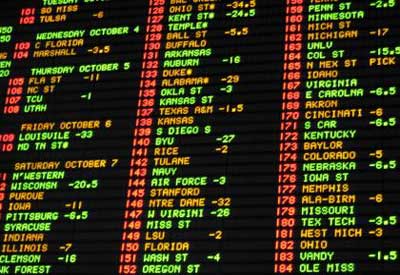Nothing further posted yet as of noon Friday. It’s coming, eventually. Meanwhile, I have posted an analyst from a sports gaming attorney at the bottom of the post on why this strategy adds up.
Another major court action is expected Friday in the battle over whether the state can implement a law allowing sports betting at the state’s horse racing tracks and Atlantic City casinos. The New Jersey Thoroughbred Horsemen’s Association on Thursday petitioned the Third Circuit Court of Appeals for a rehearing of its appeal against a 1992 law passed by Congress that bans sports betting in all but four states.
The horsemen add that the reasons will be stated in a petition to be filed “on or before November 1, 2013″ by principal partner Governor Christie. “To reduce the burden of repetition on the Court, NJTHA hereby incorporates the State Petition by reference and joins in it.” The NCAA, NFL and three other major professional sports leagues last year sued the governor in a so-far-successful effort to prevent implementation of a state law that would permit such gambling at the state’s horse racing tracks and Atlantic City casinos.
The panel’s support for a lower-court ruling in September that maintained the ban came with a partial dissent from Judge Thomas Vanaskie, who split with the majority on the specific issue of whether the sports-betting ban falls under impermissible “commandeering” by the federal government in forcing states to take certain actions. Ron Riccio, attorney for the horsemen, wrote in the brief that he believed “the panel’s majority decision is contrary to the decisions of the Supreme Court of the United States, and that consideration by the full court is necessary to secure and maintain uniformity of decisions.”
“In addition,” he wrote, “this appeal involves questions of exceptional importance, i.e., whether Congress ‘rather than regulating an activity directly’ permissibly may regulate the activity indirectly…” Among the potential relief sought by the horsemen is a reversal of a permanent injunction against the betting and/or declaring the Professional and Amateur Sports Protection Act of 1992 — sponsored by U.S. Sen. Bill Bradley, D-N.J. — to be unconstitutional. Attorneys for both sides have suggested that the high-profile case — which pits former U.S. Solicitors General on opposite sides and which has four other states joining the case in support of the anti-commandeering principle — eventually will wind up at the U.S. Supreme Court.
The 21-year-old law allowed Nevada to keep its widespread sports betting offerings, particularly in Las Vegas. Delaware, Montana, and Oregon each has the option of maintaining what was their more-limited sports betting at the time the ban was passed from Daniel L. Wallach, a sports law attorney for Becker and Poliakoff in Fort Lauderdale, Fla. “Pursuing en banc review first is a sound legal strategy. The powerful dissenting opinion by Judge Vanaskie significantly enhances the prospect of a rehearing before the entire Third Circuit. And it clearly meets the test for rehearing en banc – an issue if “exceptional importance” – not just the legality of state-sponsored sports wagering (which itself is an important issue of nationwide importance), but the broader constitutional principle of whether Congress – instead of regulating an activity directly – can indirectly regulate such activity by prohibiting states from regulating it, especially in an area (i.e., gambling) that has traditionally and historically been the province of states to regulate. Congress itself recognized this principle in 1978 when it enacted the federal Interstate Horseracing Act, which begins by stating that “the States should have primary responsibility for determining what forms of gambling may legally take place within their borders.”
PASPA plainly contravenes that longstanding principal. “While I believe that this case is eventually headed to the Supreme Court, there is no guarantee that the high court will accept the case. Its review is discretionary, and only a handful of important cases are selected. You stand a much better chance if you come to the Supreme Court with a federal statute having already been declared unconstitutional. And New Jersey has just one more chance to make that happen – and that’s with a petition for rehearing en banc. New Jersey has nothing to lose by filing a petition for rehearing en banc (it can still later file for Supreme Court review, even if the rehearing is denied), while possibly enhancing its chances for eventual Supreme Court review if the Third Circuit decides to grant rehearing en banc.
Another reason why going directly to the Supremes would have been a risky strategy is that the Third Circuit opinion is the only decision to have addressed the constitutionality of PASPA. Typically, an issue stands a much better chance for Supreme Court consideration if there is a “split among the circuits” on that issue. Absent another conflicting opinion, New Jersey’s best hopes for Supreme Court review might very well depend on the Third Circuit granting rehearing and then issuing another opinion declaring PASPA to be unconstitutional. If that were to occur, Supreme Court review would be all but assured. So I applaud New Jersey’s strategy.” –
This is a reprint from blog.northjersey.com. To view the original click here.







